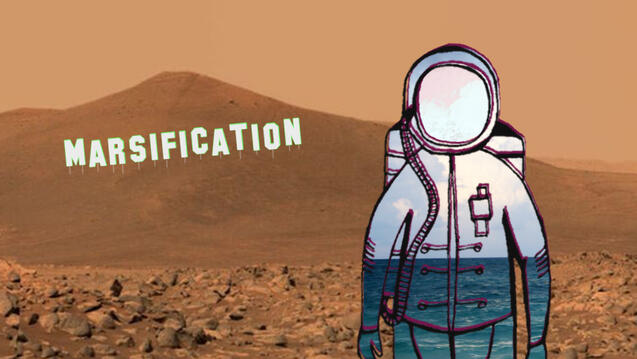Zara Zimbardo and Lily Stone collaborated on the new album Marsification: A tale of planetary grief, featured on Radio 4’s Short Cuts.

New Book Explores the World of Language Use Amongst the LGBTQIA+ Community
Groundbreaking collection of essays reveals how Critical Sexuality Studies and Lavender Languages and Linguistics combine to analyze language use, sexuality and gender, and discourse on authority and power.
The exploration of language and LGBTQIA+ experience comes alive in a new book, Critical Sexuality Studies, Lavender Languages, and Everyday Life (Bloomsbury Publishing, 2024). Critical Sexuality Studies and Lavender Languages and Linguistics are leading modes of inquiry in two different fields of sexuality studies. The ways that these modes articulate each other are joined for the first time in this volume to explore language use related to sexuality, gender, authority, and power in daily life.
Edited by Dr. Michele Marzullo, Chair and Professor in the Department of Human Sexuality at CIIS, and Dr. William Leap, Professor Emeritus in the Department of Anthropology at American University and founder of the Lavender Languages Institute at CIIS, the collection is built from presentations at the 27th annual Lavender Languages Conference to provide a cross-section of lavender language research interests, with comments in each essay showing how each discussion addresses themes in Critical Sexuality Studies.
“We tried hard in the chapters of the collection to promote dialogue between Lavender Language and Critical Sexuality Studies to show examples of research and advocacy that lie at the intersection of language, power, gender, and sexuality,” Dr. Marzullo said. “We did this to expand awareness of these language projects as modes of research and practice by providing accessible insights for colleagues working across mainstream linguistics, anthropology, sociology, psychology, social work, women’s, gender, and sexuality studies, LGBTQ studies, queer theory, and related fields.”
Dr. Marzullo said the collection, as such, raises a question: why haven’t Lavender Language Studies and Critical Sexuality Studies been in closer dialogue prior to the present time? This is one of the driving questions she and co-editor Dr. Leap address in the introductory essay. Indeed, the book briefly traces the history of Lavender Languages research in the U.S., Western and Eastern Europe, and now internationally, and compares this to the parallel growth of Critical Sexuality Studies within similar terrains.
“We note how lesbian gay studies, queer studies, and trans studies have gained differing footholds in each tradition. Attention to linguistic practices versus broadly defined social discourse have appeared across these traditions and there are lessons in these applications for those working across qualitative studies, quantitative inquiry, and research inquiries born of these approaches,” Dr. Marzullo explained. “The boundaries we seek to close in this collection have often been hostile and antagonistic, but these gaps can be mediated and this collection shows how.”
The body of the book organizes examples of Lavender Languages projects around a four-part framework: power, concepts, normativities, and abjection, with an introductory essay for each section indicating the connections between the chapters. The volume concludes with reflections showing how critical sexuality studies interests in sexuality and power benefit from the tactical methodology of Lavender Languages and Linguistics and its emphasis on socially focused studies of discourse and text related to sexually minoritized populations.
As Dr. Marzullo explains, “the book also shows how Lavender Languages perspectives valuably extend and intensify critical sexuality studies’ examinations of sex, sexualities, and gender by adding a range of geohistorical contexts, social domains, and language issues to put speaking subjects at the center of CSS inquiry, and recognizing that language-centered sexuality is performative (doing as well as being) and not merely the object and outcome of social forces.”
She went on to emphasize that “readers will derive benefits from Critical Sexual Studies as this collection of essays showcases how critical sexuality studies and Lavender Languages Studies address the sexualized and gendered concerns facing social subjects in an increasing diverse, politically polarized, and technologically dehumanizing world, while also serving as a how-to guide for researchers and advocates seeking to investigate these dynamics.”
Order your copy of Critical Sexuality Studies, Lavender Languages, and Everyday Life.
Dive deeper and engage with the experts! Join us at the Book Launch event on December 11th, 2024
Related Academic Programs
Related News
We live in times of uncertainty, with climate change and AI racing ahead. Blue Sky Leaders Facilitator Ginny Whitelaw discusses why leaders must balance AI's potential with nature's wisdom for a thriving future.
CIIS Provost Kathy Littles' statement on the importance academic freedom.



